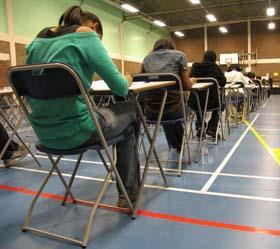Endpoint: Chas McCaw has the last word

The International GCSE (iGCSE) came under the media spotlight recently as a 'more rigorous exam and syllabus' to the new GCSEs, which were criticised by Sir Richard Sykes, rector of Imperial College London, as being too 'unscientific'. The iGCSE was launched in 1985 by Cambridge International Exams (then known as UCLES) and first examined in 1988 with the first UK GCSEs. The iGCSEs were intended to carry forward the standards of the former O-levels alongside the wider grade set (A-G) (A* came later). The iGCSE specification is increasingly being adopted by independent schools, and the Government is now considering whether it should be an option for state schools.
What does the iGCSE offer?
At Winchester College we offer the iGCSE in single science subjects, but iGCSEs are also available for double award science. In my opinion the iGCSE has four main strengths.
- Rigour. The content has not been compromised and so retains chemical challenge. The emphasis is on chemical reactions and their rationalisation within a framework of chemical ideas, and their study by physical (including quantitative) methods. There is less emphasis on peripheral topics like geology and environmental chemistry. In terms of assessment, the questions may seem more traditional, but many teachers regard this as no bad thing. The quantitative problems tend to be less trivial and the examination questions less predictable than GCSE chemistry. This all adds up to a slightly more rigorous test and greater focus in the training and preparation of students.
- Preparation for AS/A2 chemistry. In my experience, the iGCSE provides more useful training for the more advanced material students meet at A-level, and the emphasis on laboratory methods in the specification and assessment gives them a better feel for what chemistry is about and supports their understanding of the theory.
- Continuity.The iGCSE syllabus hasn't changed significantly in the past decade. This means that there has been no necessity to change schemes of work on a regular basis.
- Practical. There is more emphasis on experimental work. Students do an externally assessed laboratory practical exam (Cambridge board) or sit an 'alternative-to-practical' paper. The latter examines laboratory techniques: students take measurements from pictures of apparatus and make conclusions from calculations. Students need to interpret qualitative observations, make chemical conclusions, and plan and evaluate experimental method.
At Winchester we place a high priority on practical chemistry. We have found coursework to be time-consuming and educationally unsound. Students get obsessed by what mark they are likely to get and always demand more time to refine their reports. Moreover, the artificial requirements of the assessment criteria impose a hierarchy on the marking - the result is that worthy reports can often score low marks and vice versa. Students tend to fret over the criteria and lose sight of the more important chemical objectives. I also believe that coursework is unfair. Despite the regulations, different schools are bound to offer different levels of guidance and help. Fairness is also threatened by the spectre of plagiarism.
The iGCSE offers an alternative to all this strife. We have experience of practical exams at AS/A2-level and the alternative papers at GCSE, and find both to be worthwhile and educationally sound. They take up less time, provide a level playing field, focus on genuine laboratory skills and, being externally assessed, are much less hassle for teachers. (Schools can still do coursework with iGCSE if they choose.)
The international route
iGCSE is offered by Cambridge International Exams, which is part of the same umbrella organisation as OCR, and Edexcel. Both awarding bodies seem to be looking to the UK market, rather than concentrating on schools overseas. Since they are also involved with national GCSEs they can make comparisons and harmonise the grades awarded by the different qualifications. This means that UK schools should be at no disadvantage in terms of the final grades if they enter their students for the iGCSE rather than the GCSE.
There are some concerns among chemistry teachers, certainly in the independent sector, about the direction in which national GCSE is going. For many of us, iGCSE presents the opportunity to teach chemistry as we feel it should be taught, and to give our students the best possible foundation in chemistry at this stage of their education.
Chas McCaw is head of chemistry at Winchester College, College Street, Winchester SO23 9NA.







No comments yet